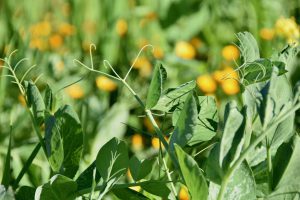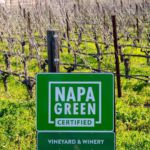
Cover crops provide many benefits and can have important effects on vineyard balance and vine vigor.
The Climate Connection: Napa Green takes on the Climate Challenge
- NAPA VALLEY REGISTER | CHRIS BENZ |
- May 2, 2021
Vintner Julie Johnson has been learning about and using regenerative farming practices at Tres Sabores winery and vineyards for more than 30 years.
These practices include planting cover crops to provide nutrients and add organic matter to the soil, limiting tilling to preserve soil organic matter and prevent erosion, and using sheep to “mow” around the vines (and deposit natural fertilizer).
Recently, she learned that because of these practices, her property is close to being “carbon neutral,” meaning that it is able to sequester the same amount of carbon as what is emitted during farming operations.
“We’ve been able to reduce tractor passes (with their carbon emissions) by switching to crimping — that is, breaking the plant stalks and leaving the plant material in the vineyard rows. We’ve also planted hedgerows and native pollinator plants, which are integral to the vineyard health and sequester even more carbon,” Johnson said.
New Napa Green Vineyard Program
The goal of becoming carbon neutral and eventually carbon negative, or climate positive, is a cornerstone of the new Napa Green Vineyard certification program being rolled out this spring.
Napa Green, an independent non-profit since late 2019, runs sustainability certification programs for vineyards and wineries. The new certification will take the place of the Napa Green Land program, bringing it to the next level of direct action on climate change and social responsibility.
Anna Brittain, executive director of Napa Green, said, “The original Napa Green Land program launched in 2004 recognized third-party certifications focused on preventing erosion and runoff for the health of the Napa River and watershed. What were leading best practices for many years are now required for environmental compliance. Our commitment is to help our members continue to grow their leadership in sustainability and climate action.”
The new program is the first sustainable winegrowing certification to focus specifically on climate action, regenerative farming, and social equity. It contains six core elements:
- Social equity, justice and inclusion requirements
- Implementing carbon farming and regenerative practices
- Irrigation assessments and water use efficiency
- Tree and forest preservation and enhancement
- Adherence to a prohibited and restricted pesticides list
- Conservation burning or burning alternatives
Social equity, justice and inclusion
Developed with a great deal of input from the agricultural community, the certification’s Social Equity, Justice and Inclusion element builds on common best practices for human resources, workforce and neighbor communications to include deeper standards like implicit bias training, sustainability engagement and opportunities for upward mobility for farmworkers.
Gustavo Aviña, viticulture director at Pine Ridge Vineyards, and member of the social equity working group said, “We had the opportunity as growers to give our input to the program, and to share our ideas, opinions and experience from working the vineyards. This certification will benefit our workers by ensuring workers’ rights, increasing benefits, and giving more opportunities for training.”
“One of the most important requirements is to encourage employees to attend training outside the company,” he added. “For me, the more prepared and educated our workers are, the better we can do as a company.”
Partnership with RCD
Several of the certification elements were developed in partnership with the Napa County Resource Conservation District (RCD), including aspects addressing carbon farm plans, irrigation and conservation burning.
“A carbon farm plan makes use of the US Department of Agriculture’s COMET and COMPOST Planners to quantify how different practices impact carbon sequestration, which in turn affects soil health,” said environmental scientist Dr. Miguel Garcia, RCD’s Sustainable Agriculture Program manager. “We look at a lot of parameters to determine soil health, and at the center is its carbon content. A carbon farm plan allows growers to balance practices that put carbon into the ground with those that put carbon into the air—and choose which practices to use.” These practices include adding compost, growing cover crops, and reducing tillage among others, he explained.
With respect to irrigation, Garcia said, “The irrigation assessment has a tremendous value for protecting our water resources so that growers are only using the amount of water they need, which also benefits grape quality. During the assessments, I’ve seen problems come up with old irrigation systems, but most changes needed are minor, for example adjusting water pressure or cleaning out irrigation lines.”
Conservation burning is the minimum required method of pile burning for pulled vines. RCD and Napa Green have been hosting workshops on this technique and will continue to do so.
“Our workshops have been led by Raymond Baltar from the Sonoma Ecology Center. He shows there is an alternative way to burn piles that reduces smoke and air pollution by 75-85% and leaves more material as charcoal,” Garcia said. “By producing this charcoal or biochar, one limits how much material goes into the atmosphere and how much carbon stays on site.”
Benefits for the Napa Valley
Julie Johnson of Tres Sabores sees many benefits in the comprehensive new program. “This expands my farm plan and sets a standard for best practices. Here at Tres Sabores, we get such positive feedback from our guests and such engagement and excitement about the regenerative practices we are able to do. Our visitors love discovering growers who are making genuine efforts to be sustainable.”
Actions you can take:
- For growers: Register to become a Napa Green Vineyard at application.napagreen.org/#/request-vineyard-account.
- For wine drinkers: Support Napa Green certified wineries and vineyards. Learn more at napagreen.org.
- Support Napa Green’s efforts with a donation to help provide implementation support at napagreen.org/donations.
- Join Napa Climate NOW’s Climate Rides June 4, 5, and 6 featuring Climate Action presentations in Napa County (and beyond)!
Making the commitment to third party certification takes time and effort, but it is worth it to demonstrate our commitment to the community and to protect our watershed, our land and the air we breathe.
- Susan Boswell, Chateau Boswell Winery


